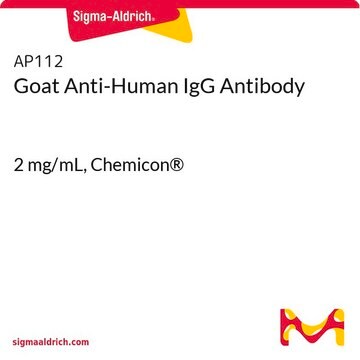AP187R
Goat Anti-Rabbit IgG Antibody, Rhodamine conjugate, Species Adsorbed
1.5 mg/mL, Chemicon®
Sign Into View Organizational & Contract Pricing
All Photos(1)
About This Item
UNSPSC Code:
12352203
eCl@ss:
32160702
NACRES:
NA.46
Recommended Products
biological source
goat
Quality Level
conjugate
TRITC conjugate
rhodamine conjugate
antibody form
F(ab′)2 fragment of affinity isolated antibody
antibody product type
secondary antibodies
clone
polyclonal
species reactivity
rabbit
manufacturer/tradename
Chemicon®
concentration
1.5 mg/mL
technique(s)
immunofluorescence: suitable
shipped in
wet ice
target post-translational modification
unmodified
Specificity
Rabbit IgG (H+L) (absorbed for minimal cross-reactivity to Human, Mouse and Rat Serum Proteins)
FLUOROPHORE/ PROTEIN ABSORBANCE RATIO
Tetramethyl Rhodamine Isothiocyanate A550/A280 = 0.54
FLUOROPHORE/ PROTEIN ABSORBANCE RATIO
Tetramethyl Rhodamine Isothiocyanate A550/A280 = 0.54
Application
Detect Rabbit IgG using this Goat anti-Rabbit IgG Antibody, Rhodamine conjugate, Species Adsorbed validated for use in IF.
Suggested dilution for most applications: 1:50-1:200 for most applications.
Optimal working dilutions must be determined by the end user.
Optimal working dilutions must be determined by the end user.
Physical form
Lyophilized. Buffer = 0.01 M Sodium Phosphate, 0.25 M NaCl, pH 7.6 with 15 mg/mL BSA, 0.01% Thimerosal and 0.05 Sodium Azide.
RECONSTITUTION:
Reconstitute to 1 mg/mL with sterile distilled water.
RECONSTITUTION:
Reconstitute to 1 mg/mL with sterile distilled water.
Legal Information
CHEMICON is a registered trademark of Merck KGaA, Darmstadt, Germany
Not finding the right product?
Try our Product Selector Tool.
Hazard Statements
Precautionary Statements
Hazard Classifications
Aquatic Chronic 3
Storage Class Code
11 - Combustible Solids
WGK
WGK 3
Certificates of Analysis (COA)
Search for Certificates of Analysis (COA) by entering the products Lot/Batch Number. Lot and Batch Numbers can be found on a product’s label following the words ‘Lot’ or ‘Batch’.
Already Own This Product?
Find documentation for the products that you have recently purchased in the Document Library.
Qi Liu et al.
Molecular medicine reports, 15(4), 2136-2142 (2017-03-06)
Hypoxia is widely accepted as a fundamental biological phenomenon, which is strongly associated with tissue damage and cell viability under stress conditions. Insulin-like growth factor‑1 (IGF‑1) is known to protect tissues from multiple types of damage, and protect cells from
Danielle A Guimarães et al.
Redox biology, 6, 386-395 (2015-09-08)
Imbalanced matrix metalloproteinase (MMP)-2 activity and transforming growth factor expression (TGF-β) are involved in vascular remodeling of hypertension. Atorvastatin and sildenafil exert antioxidant and pleiotropic effects that may result in cardiovascular protection. We hypothesized that atorvastatin and sildenafil alone or
Ye Chang et al.
International journal of molecular medicine, 41(1), 33-42 (2017-11-09)
This study aimed to explore whether angiotensin II (Ang II) inhibits the proliferation of human umbilical vein endothelial cells (HUVECs) by changing mitochondrial energy metabolism, and whether atorvastatin has a protective role via restoration of endothelial function. HUVECs were treated with 1 µM Ang II alone
Wei Ma et al.
Stem cell research & therapy, 13(1), 413-413 (2022-08-14)
Spina bifida aperta (SBA) is a relatively common clinical type of neural tube defect. Although prenatal fetal surgery has been proven to be an effective treatment for SBA, the recovery of neurological function remains unsatisfactory due to neuron deficiencies. Our
Yuan Li et al.
Molecular medicine reports, 15(5), 2673-2680 (2017-04-28)
Advanced glycation end products (AGEs) restrain the proliferation of endothelial cells, which is an important determinant of diabetic vasculopathy. Mitochondrial biogenesis serves an essential role in cellular adaptation and repair. The current study aimed to investigate alterations in mitochondrial energy
Our team of scientists has experience in all areas of research including Life Science, Material Science, Chemical Synthesis, Chromatography, Analytical and many others.
Contact Technical Service








